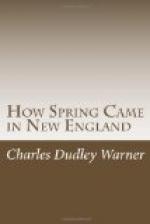This is called the breaking-up of winter.
Nature seems for some days to be in doubt, not exactly able to stand still, not daring to put forth anything tender. Man says that the worst is over. If he should live a thousand years, he would be deceived every year. And this is called an age of skepticism. Man never believed in so many things as now: he never believed so much in himself. As to Nature, he knows her secrets: he can predict what she will do. He communicates with the next world by means of an alphabet which he has invented. He talks with souls at the other end of the spirit-wire. To be sure, neither of them says anything; but they talk. Is not that something? He suspends the law of gravitation as to his own body—he has learned how to evade it—as tyrants suspend the legal writs of habeas corpus. When Gravitation asks for his body, she cannot have it. He says of himself, “I am infallible; I am sublime.” He believes all these things. He is master of the elements. Shakespeare sends him a poem just made, and as good a poem as the man could write himself. And yet this man—he goes out of doors without his overcoat, catches cold, and is buried in three days. “On the 21st of January,” exclaimed Mercier, “all kings felt for the backs of their necks.” This might be said of all men in New England in the spring. This is the season that all the poets celebrate. Let us suppose that once, in Thessaly, there was a genial spring, and there was a poet who sang of it. All later poets have sung the same song. “Voila tout!” That is the root of poetry.
Another delusion. We hear toward evening, high in air, the “conk” of the wild-geese. Looking up, you see the black specks of that adventurous triangle, winging along in rapid flight northward. Perhaps it takes a wide returning sweep, in doubt; but it disappears in the north. There is no mistaking that sign. This unmusical “conk” is sweeter than the “kerchunk” of the bull-frog. Probably these birds are not idiots, and probably they turned back south again after spying out the nakedness of the land; but they have made their sign. Next day there is a rumor that somebody has seen a bluebird. This rumor, unhappily for the bird (which will freeze to death), is confirmed. In less than three days everybody has seen a bluebird; and favored people have heard a robin or rather the yellow-breasted thrush, misnamed a robin in America. This is no doubt true: for angle-worms have been seen on the surface of the ground; and, wherever there is anything to eat, the robin is promptly on hand. About this time you notice, in protected, sunny spots, that the grass has a little color. But you say that it is the grass of last fall. It is very difficult to tell when the grass of last fall became the grass of this spring. It looks “warmed over.” The green is rusty. The lilac-buds have certainly swollen a little, and so have those of the soft maple. In the rain the grass does




